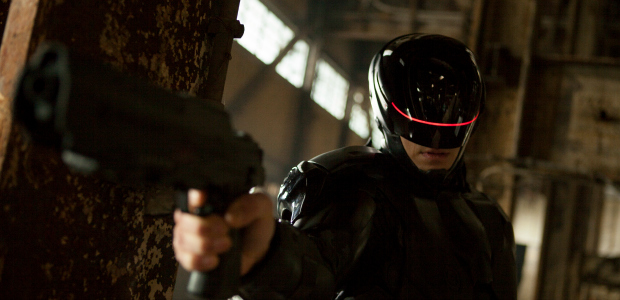RoboCop
A remake that's rather embarrassed of itself.
Plot summary
OmniCorp's drones are winning American wars around the globe and now they want to bring this technology to the home front. After a cop is critically injured in the line of duty, OmniCorp utilizes their remarkable science of robotics to save Alex's life. He returns to the streets of his beloved city with amazing new abilities, but with issues a regular man has never had to face before.

Paul Verhoeven’s original RoboCop was a deft satire of big business and aggressive media bias, a black comedy made in the midst of Reaganomics and the War of Drugs. RoboCop’s dystopian Detroit presents us with an economically crippled state overseen by the despotic corporation Omnicorp. Omnicorp is exploiting the soaring crime rates by investing in military robotics and surveillance, which it markets towards and uses against the brainwashed denizens of Detroit. In hindsight, it’s impossible to ignore the prophetic nature of the film. As the economy continues to falter, Google quietly amasses its own private army of robots, our personal correspondence is scrutinised in the name of national security and flying drones are being prepped for everything from military strikes to amazon.com deliveries.
Despite the prescience of its arrival, for investors at Sony and MGM the new RoboCop is merely another recognisable property ready to be exploited and franchised for a teenage market. Graphic violence and adult themes have been toned down to allow for younger demographics, CGI-driven IMAX spectacles have been front loaded to ease its cultural export to China, and the budget has an extra zero at the end.
The subversive elements of the original have been transposed to the remake and Neo-Robocop makes all the right noises, but unsurprisingly; it lacks the teeth of its scrappy predecessor. Hollywood’s dependence on branded properties is the epitome of glossy corporate cynicism, and in that context the remake’s efforts to ridicule big business feel like the pot calling the kettle black. In fact, the scene where Omnicorp’s boss flippantly has RoboCop repainted black to make him look cooler could have come directly from MGM’s boardroom.
Seemingly aware of this inherent contradiction, director José Padilha fumbles the tone of the film, failing to commit to either an earnest human drama, a body horror sci-fi or a black comedy. Following the trend of austere cinematic reincarnations of properties such as Bond and Batman, it’s clear that Padilha is striving for something more mature here. However, scenes such as those involving Alex’s wife and son are unconvincing and maudlin. Whereas the original made no apologies for the absurdity of its central conceit, the remake is rather embarrassed of itself, which makes the whole affair feel rather gutless.
RoboCop feels embarrassingly old fashioned in places. We are occasionally granted the perspective of RoboCop’s visor, which features graphics that look more ‘MS-DOS’ than Google Glass. There are countless missed opportunities like this to modernise the feel of the franchise in a way that would resonate with fresh audiences. Robocop also fails to deliver as a satisfying action film. Its big sequences have no real pulse to them, the anarchic violence is gone, and compared to last year’s excellent Dredd, nothing here truly excites.
Padilha has assembled a strong cast, but misses opportunities here too. Samuel L. Jackson gives a spirited performance, but has been heinously miscast as a Bill O’Reilly-type Republican broadcaster. Gary Oldman is here, but ultimately has very little to do. The film does comes to life occasionally thanks to the buoyant presence of Michael Keaton, the only participant with a clear grasp of the material. Another welcome presence is Jay Baruchel, who elevates his scenes with strong comedic instincts and sure footed delivery. When his character pleas for mercy by crying ’Don’t kill me! I’m just from marketing!’ the gag works, but it boomerangs. This time, the joke’s on Hollywood.











COMMENTS